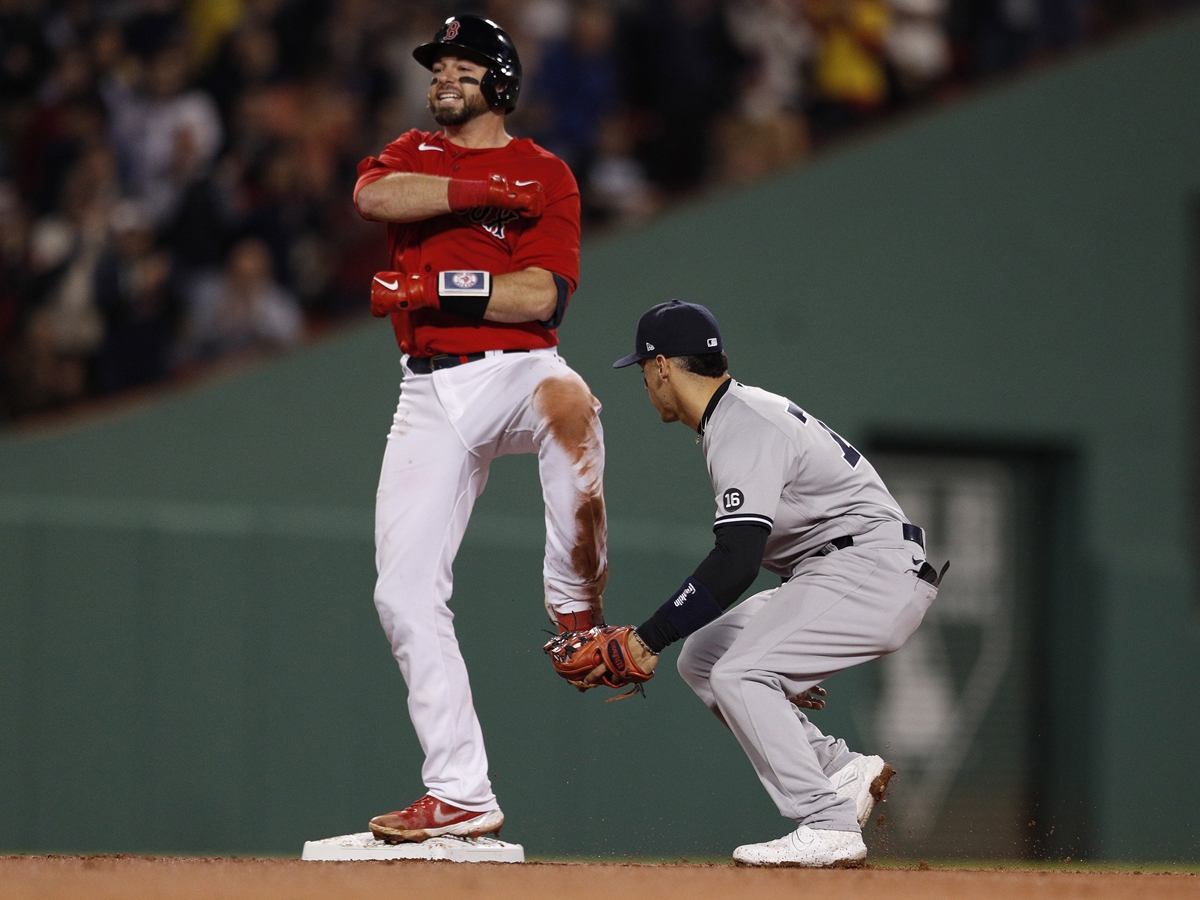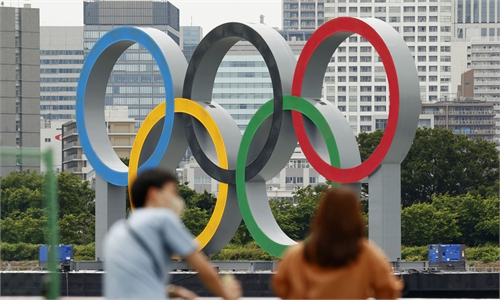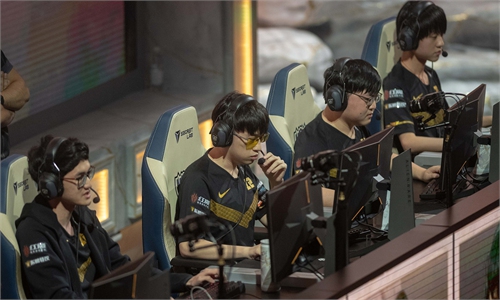
Boston Red Sox' Kevin Plawecki (left) reacts after stretching a double while beating the tag by New York Yankees shortstop Andrew Velazquez (right) in Boston, Massachusetts, on October 5, 2021. Photo: IC
"When money comes in at the gate, sport flies out of the window." So said Theodore Roosevelt in 1905 and the words of the 26th US president seem very much of his time.
Sport has certainly moved on over the last century and for all of Roosevelt's impact on keeping American football part of his country's mainstream collegiate offerings, the world has otherwise moved on.
Amateurism is definitely not a part of the sporting world in anything like the same way with even Olympians and US college athletes now eligible for lucrative sponsorships and professional contracts.
Nowadays some might even say that money is the name of the game, whether that be for the athletes, teams or their governing bodies.
Just last week Forbes published their list of the most valuable sporting empires - proof as if it were needed that the business of sport transcends the sports themselves.
This is a world where the New York Yankees of Major League Baseball - estimated value in 2021 put at some $5.25 billion - are the figurehead of a sporting web that extends well beyond the ballpark at Yankee Stadium and the surrounding streets.
Yankee Global Enterprises own, among other things, a stake in the Major League Soccer side New York City FC. The football team just became champions of the MLS for the first time, bringing a championship to New York that the Yankees have not done since 2009.
Sport is big business and those in big business have taken notice. Manchester City owners City Football Group has attracted investment from China Media Capital and Silver Lake in recent years, with Fenway Sports Group has seen a cash injection from RedBird Capital and Arctos Sports Partners in the last 12 months.
Sporting megacompanies are now all the rage in the sporting world, as can be seen over at the AMB Group.
The company owns the Atlanta Falcons of the NFL and Atlanta United of the MLS, while Monumental Sports & Entertainment can claim a sporting stable that includes the Washington Wizards of the NBA, the Washington Capitals of the NHL and the Washington Mystics of the WNBA, alongside various other non-team ownership interests in the sporting field.
Liberty Media is the leader in the field as evidenced by its place at the top of the list on Forbes' rundown of sporting empires.
Among their ranks Liberty can count the World Series champion Atlanta Braves and Formula 1, a sport which has only increased its potential market with its Netflix series and last season's dramatic finale. Liberty own the Braves stadium and have an interest in the Kroenke Arena Company - which owns the Ball Arena, where the NBA's Denver Nuggets and the Colorado Avalanche of the NHL play their home games. Liberty also have minority interests in the Drone Racing League and the Meyer Shank Racing team.
With sports teams, promotions and real estate, the Liberty model provides a lucrative blueprint that others are looking to follow and with a value of $17.2 billion, according to Forbes, it is not hard to see why that is the case, especially as the value has said to have grown some 32 percent last year.
It is also perhaps no coincidence that Kroenke Arena Company owner Stan Kroenke has the next most valuable sporting empire, Kroenke Sports and Entertainment.
Kroenke's portfolio includes the NFL's Los Angeles Rams, the NHL's Colorado Avalanche, the NBA's Denver Nuggets, the Colorado Rapids of the MLS. They also won English Premier League side Arsenal among some smaller investments in the sports industry such as the Colorado Mammoth pro lacrosse team. This all combines to tip the value of the company past the $10 billion mark, which would be set to rise further if the Rams can make the Super Bowl this year.
Multinational, multisport investment is also the model used by the world's third-most valuable sporting empire, according to Forbes.
Fenway Sports Group own baseball giants the Boston Red Sox, English Premier League titans Liverpool and the NHL's Pittsburgh Penguins - a team that they only bought in December. FSG owner John Henry has overseen investments in a number of other sporting and sports-adjacent organizations too, creating a company worth some $9.8 billion, Forbes say.
Dallas Cowboys owner Jerry Jones owns the fourth-ranked sporting empire, with the NFL team - once known as "America's team" serving as the jewel in the crown.
Jones also owns The Star, the multiuse real estate complex that houses the team's headquarters and training center.
That is not to say that on the field success comes easy despite the strong business acumen behind the teams. The Cowboys are the most valuable sports team in the world - valued at over $5 billion - but have not won a Super Bowl since 1996.
This season the team bowed out in farce in defeat to the San Francisco 49ers.
Success to some degree is secondary for owners when it comes to sporting empires, as Madison Square Garden Sports and its $7.84 billion suggests.
The owners of the NBA's New York Knicks and NHL's New York Rangers have two of the biggest teams in the US - as well as the Harford Wolf Pack lacrosse team - and they will remain so even without a championship. This is a long-term recipe for success.
That is also the case for New York Yankees owners Yankee Global Enterprises, who are the sixth most valuable sporting empire. That can seem a little incongruous given the ubiquity of the MLB team's merchandise worldwide.
Sporting empires are only set to grow now that money has come in the gate, in Roosevelt's terms. That's why the Glazer family own the NFL's Tampa Bay Buccaneers and English Premier League side Manchester United, why Fulham FC owner Shahid Khan also owns the NFL's Jacksonville Jaguars and All Elite Wrestling, and why Leeds United are part of the same stable as the San Francisco 49ers.
It's a small world when it comes to sports ownership.



